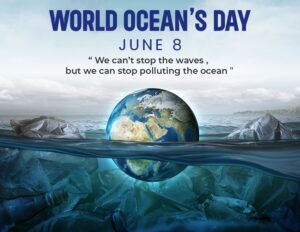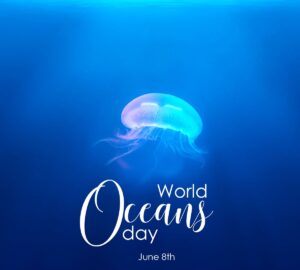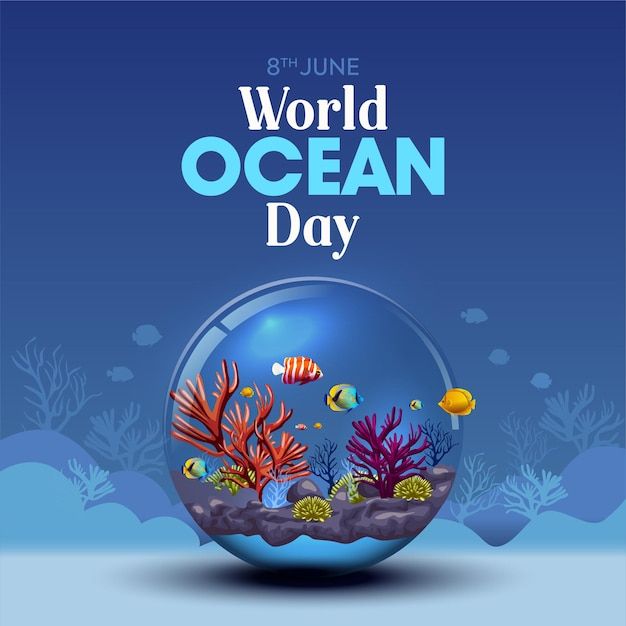🌐 World Oceans Day: History, Facts, FAQs, Timeline, Significance, Wishing, Observance, and Importance in Our Lives
Our oceans cover over 70% of the planet, produce more than half of the oxygen we breathe, and regulate our climate. They are home to spectacular biodiversity, from tiny plankton to majestic blue whales. Yet, oceans are in crisis—overfishing, pollution, rising temperatures, and acidification are endangering marine life and threatening human livelihoods.
- 📜 History of World Oceans Day
- 🧭 Timeline of World Oceans Day
- 🌊 9 Unbelievable Facts About World Oceans Day
- 🌎 Significance of World Oceans Day
- 🌐 Observance Activities You Can Join
- 🤔 FAQs – World Oceans Day Explained
- Q1. What is the official theme for World Oceans Day 2025?
- Q2. Why June 8?
- Q3. Who organizes it?
- Q4. Can children participate?
- Q5. Why is ocean health a human issue?
- ✨ Wishing Messages for World Oceans Day
- 🔑 Important Observance Points
- 🧬 Daily Life Impact of Oceans
- 🫱 Importance of World Oceans Day in Our Lives
- 🫂 Importance in Society
- 🧾 Conclusion – Oceans: The Heartbeat of Earth
That’s where World Oceans Day steps in.
Celebrated every year on June 8, World Oceans Day is not just a day of admiration—it’s a global call to action. It’s about celebrating, protecting, and sustainably managing our oceans for future generations.
Let’s dive deep into its origin, evolution, importance, and how we can all become ocean guardians.
📜 History of World Oceans Day
The concept of World Oceans Day was first proposed in 1992 by Canada at the Earth Summit in Rio de Janeiro (UNCED). The idea was simple yet profound: dedicate a day to honor the oceans’ crucial role in our life and to promote sustainable marine practices.
However, it wasn’t until 2008 that the United Nations officially recognized June 8 as World Oceans Day.
Since then, millions across the globe—from schools to governments—have joined in rallies, cleanups, awareness drives, and educational activities to honor our oceans.

🧭 Timeline of World Oceans Day
| Year | Event |
|---|---|
| 1992 | Concept proposed at Earth Summit, Rio de Janeiro |
| 2002 | First major civil observance coordinated by The Ocean Project |
| 2008 | UN officially designates June 8 as World Oceans Day |
| 2015 | Theme “Healthy Oceans, Healthy Planet” gains global momentum |
| 2020 | Virtual participation surges due to COVID-19 |
| 2023 | Theme: “Planet Ocean: Tides are Changing” |
| 2025 | Theme expected to focus on “Ocean Climate Action Now” |
🌊 9 Unbelievable Facts About World Oceans Day
Oceans absorb 30% of the carbon dioxide we produce, buffering climate change.
Over 3 billion people depend on marine and coastal biodiversity for their livelihoods.
Oceans generate over 50% of the oxygen we breathe.
Plastic pollution kills over 100,000 marine mammals and millions of birds annually.
Coral reefs support 25% of all marine life but occupy less than 1% of the seafloor.
Every minute, the equivalent of a garbage truck of plastic ends up in the ocean.
More than 80% of ocean pollution comes from land-based activities.
Ocean-related industries contribute $2.5 trillion USD annually to the global economy.
The deepest part of the ocean, Mariana Trench, is over 36,000 feet deep—deeper than Mount Everest is tall.
🌎 Significance of World Oceans Day
This day serves multiple layers of purpose:
🌱 Environmental Awareness
It reminds us that oceans are not limitless. It educates people about:
Plastic pollution
Coral bleaching
Overfishing
Marine habitat destruction
💡 Policy and Governance
World Oceans Day pushes nations toward:
Enacting Marine Protected Areas (MPAs)
Enforcing sustainable fishing laws
Supporting ocean-based climate solutions
🧠 Educational Opportunities
Educational institutions run:
Marine biology webinars
Environmental science contests
Debates and art competitions
🤝 Global Unity
It fosters global partnerships among NGOs, governments, businesses, and individuals.
🌐 Observance Activities You Can Join
Here’s how people across the globe celebrate and protect the oceans:
🧼 Beach cleanups
🎨 Art contests for marine conservation
📢 Social media campaigns using hashtags like #WorldOceansDay #ProtectOurOceans
🌍 Virtual panels and webinars
🎥 Documentary screenings
🎓 Ocean-themed workshops and exhibitions

🤔 FAQs – World Oceans Day Explained
Q1. What is the official theme for World Oceans Day 2025?
Expected to be “Ocean Climate Action Now”, urging immediate efforts toward marine conservation.
Q2. Why June 8?
It commemorates the 1992 Earth Summit when the concept of this observance was first introduced.
Q3. Who organizes it?
While the UN officially recognizes the day, many activities are coordinated by The Ocean Project, UNEP, UNESCO, and local NGOs.
Q4. Can children participate?
Yes! Kids are encouraged to join cleanup drives, learn marine science, and share creative content about oceans.
Q5. Why is ocean health a human issue?
Because oceans regulate our climate, food supply, air quality, and provide jobs. A dying ocean directly threatens human survival.
✨ Wishing Messages for World Oceans Day
🌊 “Let’s give back to the ocean that gives us life. Happy World Oceans Day!”
🐢 “Wishing you tides of awareness, waves of action, and oceans of change.”
🌍 “This World Oceans Day, be a voice for the blue planet!”
🌿 “Don’t let the ocean become a plastic soup. Act today!”
🔑 Important Observance Points
Stop using single-use plastics
Support ocean-friendly businesses
Choose sustainable seafood
Reduce your carbon footprint
Learn about ocean literacy
Advocate for strong marine laws
🧬 Daily Life Impact of Oceans
Think you’re far from the sea? Think again.
Here’s how oceans affect your everyday life—even if you live inland:
| Ocean Role | How It Helps You |
|---|---|
| Oxygen Production | 1 out of every 2 breaths you take comes from the ocean |
| Climate Regulation | Oceans store and redistribute heat |
| Rainfall Cycle | Drives weather patterns and agriculture |
| Food Supply | Source of fish, seaweed, salt |
| Job Creation | Over 60 million people work in marine industries |
🫱 Importance of World Oceans Day in Our Lives
World Oceans Day is a mirror to our consumption habits, a reminder to slow down, rethink, and restore.
It’s not just for marine biologists—it’s for parents, students, farmers, teachers, and leaders.
It’s about realizing that every plastic straw, every carbon footprint, every seafood choice matters.
This day offers a chance to hit reset, to step back and ask:
Are we being kind to the life source that sustains us?
🫂 Importance in Society
Economic Vitality: From shipping and tourism to food supply, oceans fuel industries.
Public Health: Polluted oceans mean contaminated seafood and poor air quality.
Climate Protection: Healthy oceans buffer extreme climate events.
Cultural Identity: Many communities see the ocean as sacred and integral to their history.
Scientific Discovery: Oceans hold untapped medical, technological, and environmental insights.
🧾 Conclusion – Oceans: The Heartbeat of Earth
Oceans don’t just separate continents—they connect life.
They provide, protect, and pulse with life. Yet they silently suffer.
World Oceans Day is your opportunity—not just to learn but to act, influence, and inspire. The choice to be an ocean warrior doesn’t require wealth or power. It starts with awareness and intention.
🌊 “We are tied to the ocean. And when we go back to the sea, whether to sail or to watch – we are going back from whence we came.” – John F. Kennedy
Let’s rise like the tide—for the sake of our only Blue Planet.








